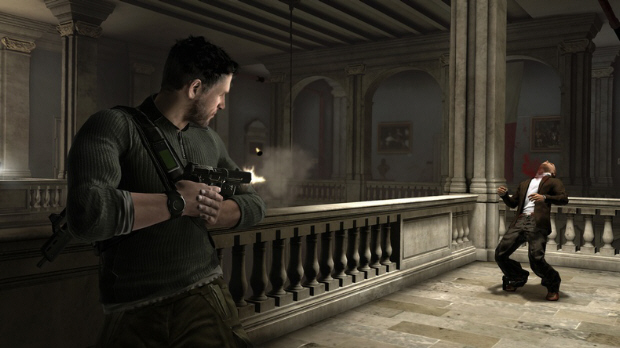Splinter Cell: Conviction is my most anticipated game of 2010. I’ve always loved stealth games in theory, but even the genre’s best entries like Metal Gear Solid or Splinter Cell: Chaos Theory fall too heavily on one side of the difficulty spectrum. Metal Gear Solid is forgiving to the point of laughability on anything but the hardest settings; previous Splinter Cell games have been so high-consequence that single mistakes can force you to restart entire missions.
After Arkham Asylum renewed my faith in the stealth genre, I was desperate to see what Conviction could bring to the table. Would it be a stealth game? A tactical third-person shooter? An unholy, potentially incredible combination of all these things?
Today’s demo answered some, but not all, of those questions.
Hit the jump for my impressions.
My first playthrough of the Conviction demo saw me acting like a complete idiot. I’d mark the wrong guys, awkwardly sprint toward a guy with the intention of melee-killing him after he’d already started firing at me, and generally act like the exact sort of idiot that the game didn’t want me to be. I survived through a normal-difficulty playthrough like this, but I couldn’t shake that feeling I’d grown so accustomed to over the course of the Splinter Cell series: that I was doing everything wrong, and ruining the experience through my own stupidity.
I cranked the difficulty up to “realistic,” and tried again.
About half of that playthrough still resulted in really, really dumb decisions (note to self: don’t bother throwing an EMP grenade when there’s nothing electronic around to disrupt), but occasionally, and quite suddenly, I’d become the exact sort of player Conviction wanted me to be. Instead of heading through a front door, I’d climb through a window and pull a guy out; instead of awkwardly defeating a room full of soldiers using Nathan Drake-esque stop-and-pop tactics, I’d hang from the ceiling, crush them using environmental hazards, and actually think about who I should mark for execution.
This, to me, is where Conviction shines. When the higher difficulty convinces-slash-urges you to stop playing the game like a shooter and start planning the optimum way to take down your enemies in the shortest span of time possible, some cool shit can happen.

Example:
I’m on the second floor. A click of the sonar button (which I now prefer to Sam’s typical thermal vision, actually) reveals what I’m up against. Below me, two baddies stand back-to-back in a relatively cramped room, while a third lingers near the exit. They’re too spread out to kill with a single grenade blast, so I toss a frag at the furthest guy. He sprints back to his teammates. Marking two of the baddies for execution, I jump over the railing and perform a “death from above” move on the third, unmarked baddie. As he dies, I press the Y button. Without stopping for breath, the two other soldiers die less than a second after I’ve landed.
At the risk of sounding like a shill, these are the moments the trailers and previews promised us: observation followed by planning followed by sudden, violent execution. I’d previously worried that the mark and execute mechanic would make things too easy on the player or take too much control out of the player’s hands, but it ended up being my favorite part of the game. Without it, you wouldn’t be able to pull off the explosively fast kill combos that set Conviction apart.
That said, it’s extremely easy to screw these moments up. It’s much harder to die in Conviction than, say, Chaos Theory, but Conviction still feels like a high-consequence game. The only difference this time around is that failure results in you killing the bad guys but feeling like an idiot, rather than getting killed and having to restart the section. Screwing up doesn’t provide cool, improvisational opportunities; it just makes you feel dumb. And that’s not fun.

For me, the challenge will be how the full game can balance its difficulty against the player’s ability to pull off really cool takedowns. Can the full game empower me to think critically and act efficiently, or will half of my attempted executions result in awkward quasi-failure?
I like where the game is going, regardless of how different it may be from the wonderful Chaos Theory and the somewhat less-wonderful Double Agent. I dig the environmental HUD. Since I always killed every guard I met in previous Splinter Cell games, it’s nice to see Conviction base its stealth entirely around taking down enemies rather than avoiding them. As it stands, I’m still very much looking forward to getting my hands on a copy of the full game (even if I won’t be reviewing it — that bastard Conrad nabbed the spot before me).
Until then, I’m gonna find out if I can get through the demo without alerting anyone to my presence.


